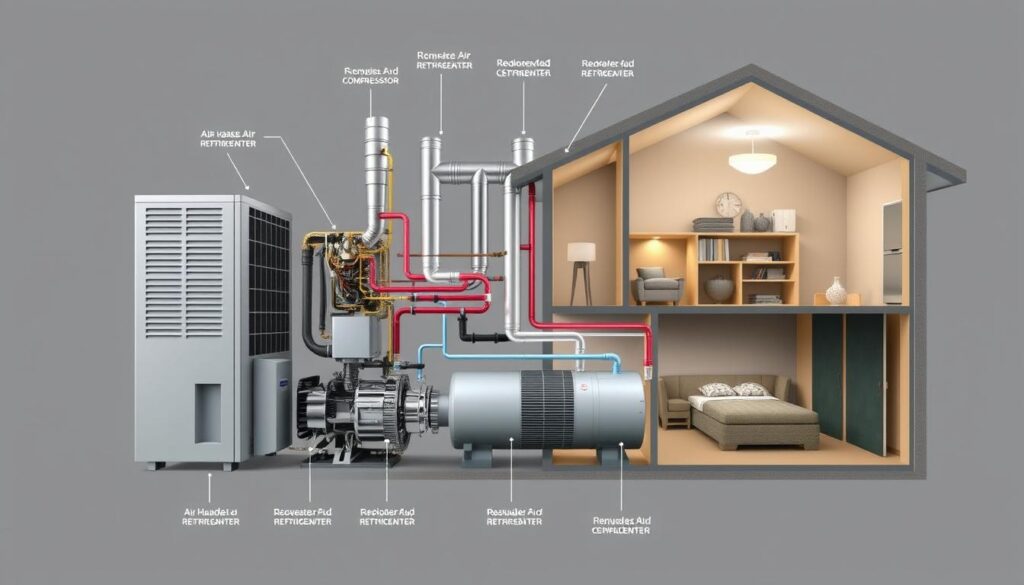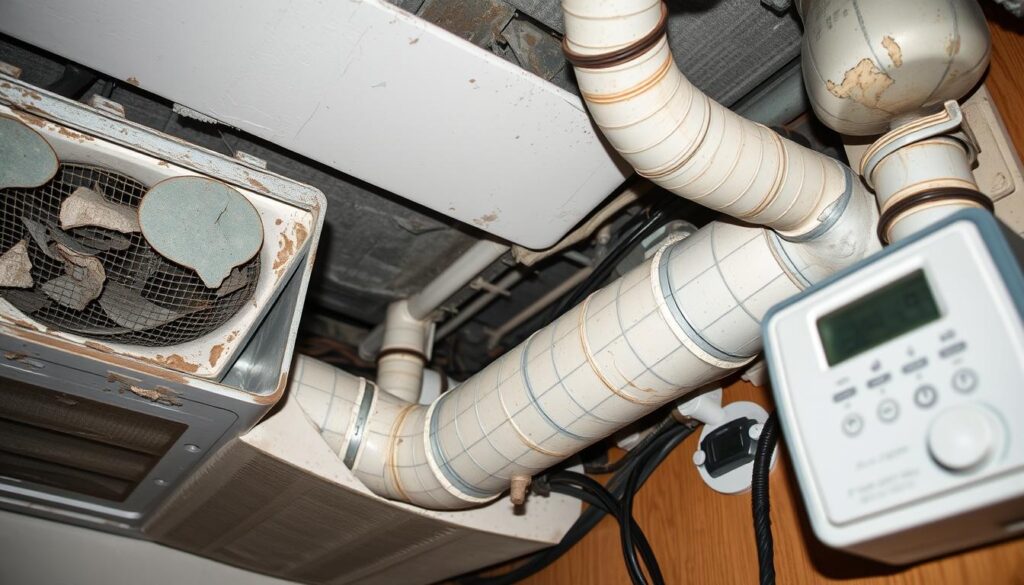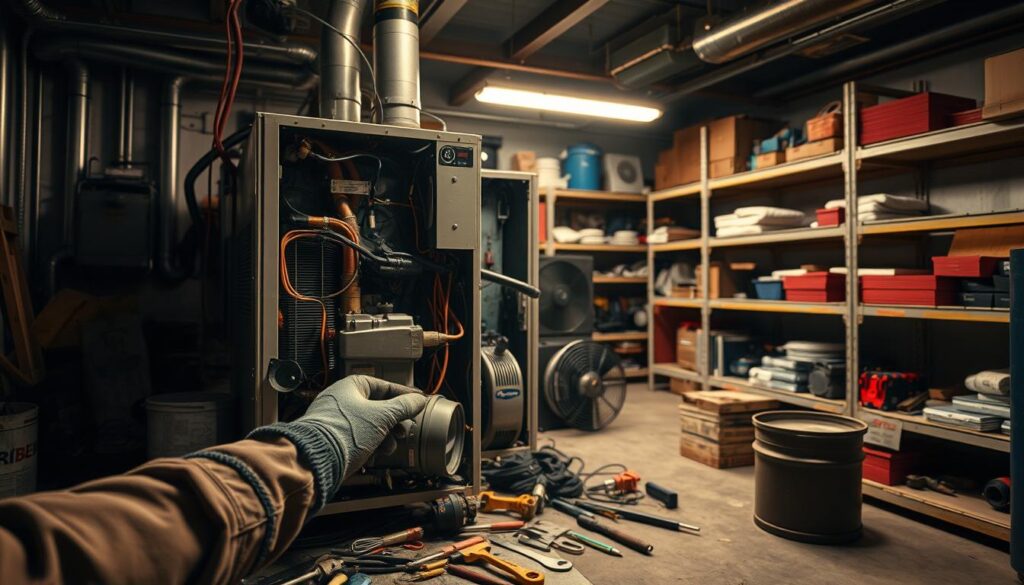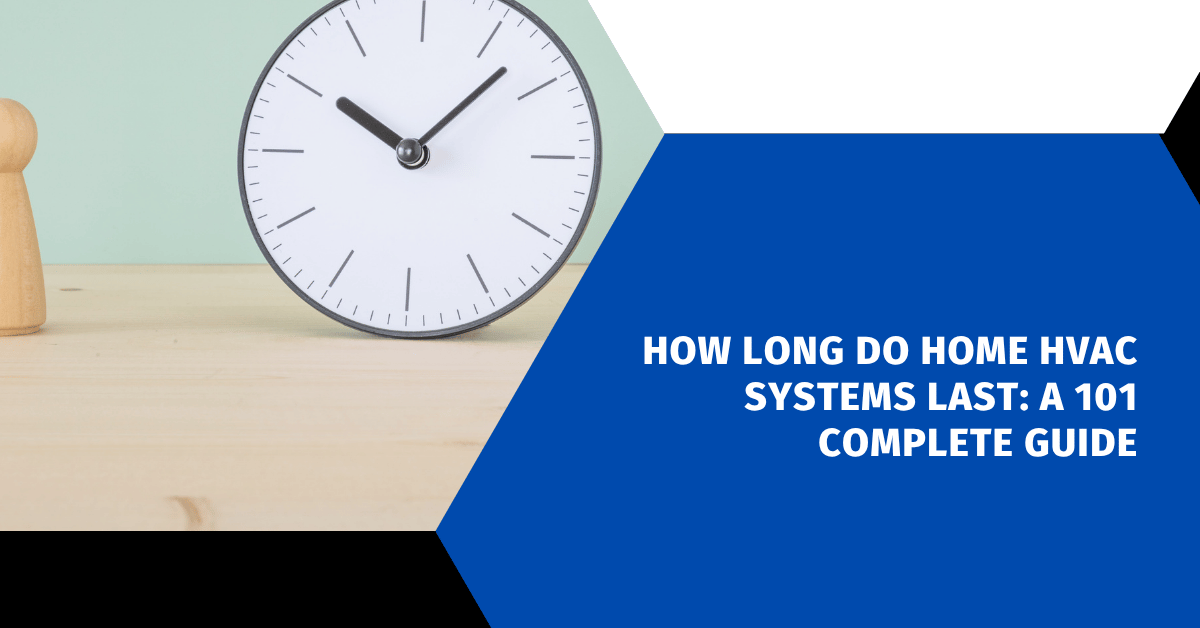Affiliate Disclosure
HVAC Guide Guys is a participant in the Amazon Services LLC Associates Program, an affiliate advertising program designed to provide a means for sites to earn advertising fees by advertising and linking to Amazon.
How Long Do Home HVAC Systems Last? Ever thought about how long your home’s HVAC system will keep you cozy? Knowing how long it lasts can save you a lot of money on repairs and energy bills.
HVAC systems usually last 15 to 20 years. But, this can change a lot based on how well you take care of it, how often you use it, and your local environment. To make your HVAC last longer, taking care of it early on is key.

New HVAC tech is getting better and lasting longer. For homes, systems usually go for about 15 years. But, some top-notch ones might last up to 30 years with the right care.
Key Takeaways
- HVAC systems typically last 15-20 years
- Regular maintenance can extend system life
- Climate and usage impact system longevity
- Energy efficiency decreases with aging systems
- Professional inspections are key for best performance
Table of Contents
Understanding HVAC Systems and Their Components
HVAC systems are key to home comfort. They keep your home at the right temperature and air quality. Knowing how they work helps you choose the right replacement and keep them running well.
Modern homes need advanced heating, ventilation, and air conditioning systems. These systems control temperature, humidity, and air quality.
Different Types of HVAC Systems
Homeowners can pick from several HVAC systems:
- Central Air Conditioning Systems
- Heat Pumps
- Furnace Systems
- Ductless Mini-Split Systems
- Boiler Systems
Key Components and Their Functions
| Component | Primary Function |
|---|---|
| Compressor | Circulates refrigerant and transfers heat |
| Condenser Coil | Releases or absorbs heat from the system |
| Evaporator Coil | Cools and dehumidifies indoor air |
| Blower Motor | Circulates air through ductwork |
The Importance of HVAC in Home Comfort
Your HVAC system does more than just control temperature. It creates a balanced indoor environment that protects your health and home. Keeping it maintained and replacing it when needed improves air quality and energy use.
Explore Our HVAC Shop
Looking for top-rated HVAC tools, parts, and accessories? Visit our shop and find the perfect solution for your needs.
Visit the ShopAverage Lifespan of Different HVAC Components
Knowing how long different parts of your HVAC system last is key for homeowners. Each part has its own expected life span. This affects your home’s comfort and how well it uses energy.
Let’s look at the typical lifespans of important HVAC parts:
- Central Air Conditioners: 15 to 20 years
- Furnaces: 15 to 30 years
- Heat Pumps: 10 to 15 years
- Air Handlers: 15 to 20 years
- Ductwork: 15 to 25 years
“Proper maintenance is the key to extending hvac system life and maximizing your investment.”
Several factors affect how long your HVAC system lasts. The quality of installation, regular upkeep, and the environment around it are all important. They help decide how well your system will work over time.
About 20% of HVAC systems fail before they should. This shows how important it is to keep up with maintenance and fix problems early. This can stop your system from breaking down too soon.
To make your HVAC system last longer, try these tips:
- Get a professional to check your system every year
- Change your filters often
- Keep the outdoor unit clean and free from blockages
- Watch how your system is doing
By taking care of your HVAC parts, you can make them last longer. This can save you money by avoiding expensive repairs or replacements.
How Long Do Home HVAC Systems Last
Knowing how long your home HVAC system will last is key for upkeep and future replacements. Most systems last between 10 to 25 years. This depends on several factors.
Factors Affecting System Longevity
Several elements affect how long your HVAC system will last. These include:
- Regular maintenance frequency
- Quality of initial installation
- Local climate conditions
- Usage patterns
- System quality and brand
Expected Lifespans by System Type
Different parts of your HVAC system have different lifespans. This is when they are well-maintained:
| HVAC System Type | Average Lifespan |
|---|---|
| Central Air Conditioning Units | 12-17 years |
| Heat Pumps | 15-25 years |
| Furnaces | 15-20 years |
| Geothermal Heat Pumps | 25-30 years |
| Window Unit AC | 10 years |
Impact of Climate and Usage Patterns
Climate greatly affects your HVAC system’s lifespan. Extreme temperatures and humidity can wear it down faster. Systems in milder climates tend to last longer than those in harsher weather.
How you use your system also matters. Running it too much, not sizing it right, and not keeping it up can shorten its life.
Explore Our HVAC Shop
Looking for top-rated HVAC tools, parts, and accessories? Visit our shop and find the perfect solution for your needs.
Visit the ShopSigns Your HVAC System Needs Replacement

Spotting the signs of an old HVAC system can prevent sudden failures and expensive fixes. A working heating and cooling system keeps your home comfortable. Knowing when to replace your HVAC unit helps save money and keeps your home cozy.
Look out for these key warning signs that your HVAC system might need to be replaced:
- Frequent and Costly Repairs: Spending over 50% of a new unit’s cost on repairs each year means it’s time for a new HVAC.
- Unusual Noises and Odors: Strange sounds or smells mean your system is in trouble.
- Inconsistent Temperatures: If your home has hot and cold spots, your system is not working well.
- Rising Energy Bills: If your energy costs go up by 30% or more, your system is not efficient.
Age is also a big factor in HVAC system health. Most systems lose half their efficiency after 10 years. They usually last between 15 to 25 years. As your unit gets older, you’ll notice more signs of wear.
“When repair costs keep going up and comfort drops, getting a new HVAC system is often the best choice.”
Other warning signs include a lot of dust, poor humidity control, and ongoing problems. Replacing your system early can stop sudden failures and save energy in the long run.
Essential Maintenance Tips to Extend HVAC Lifespan
Keeping your HVAC system in top shape needs regular care. By following key maintenance tips, you can make your system last longer and avoid expensive repairs.
Proper maintenance is key to a long-lasting HVAC system. Homeowners can take several steps to keep their system running efficiently.
Regular Maintenance Checklist
- Replace air filters every 1-3 months
- Clean air vents and registers quarterly
- Check thermostat settings and battery
- Inspect outdoor unit for debris and vegetation
- Maintain two-foot clearance around exterior unit
Professional Service Requirements
Professional HVAC maintenance is vital for your system’s longevity. Experts suggest getting professional tune-ups twice per year – in spring and fall.
- Annual professional inspection
- Comprehensive system performance evaluation
- Cleaning of internal components
- Refrigerant level check
- Electrical connection assessment
DIY Maintenance Guidelines
While professional help is important, homeowners can do some maintenance tasks too:
- Clean condensate drain line every few months
- Monitor energy bills for unexpected spikes
- Keep indoor and outdoor units clean
- Use programmable thermostat to reduce system strain
- Seal home leaks to improve system efficiency
By following these maintenance tips, you can extend your system’s life, save on energy, and avoid costly repairs.
Explore Our HVAC Shop
Looking for top-rated HVAC tools, parts, and accessories? Visit our shop and find the perfect solution for your needs.
Visit the ShopCommon HVAC Problems and Solutions

Knowing about common HVAC issues can help you keep your system running well. It also helps avoid expensive repairs. Homeowners often face several problems that affect how well their systems work.
Dirty air filters are a big problem. They can cut airflow by up to 15%. This makes your system work harder and use more energy. It’s a good idea to change filters every 2-3 months to keep things running smoothly.
- Thermostat malfunctions causing erratic system cycling
- Refrigerant leaks reducing cooling effectiveness
- Blocked condensate drain lines leading to possible water damage
- Unusual system noises indicating mechanical issues
Some problems need a pro to fix them. Refrigerant leaks, for example, are tricky and dangerous. If your air feels warm or your evaporator coils are frozen, it might be a sign of a leak.
Preventive maintenance can solve up to 90% of HVAC problems. Fixing issues early helps your system last longer and work better.
- Schedule biannual professional inspections
- Clean or replace air filters regularly
- Check for unusual sounds or performance changes
- Monitor system efficiency and energy consumption
Being proactive can save you money and keep your HVAC system running well all year.
Cost Considerations for HVAC Replacement
Getting a new HVAC system is a big decision for homeowners. The cost of replacing your HVAC can seem high at first. But, knowing the long-term savings can help you make a wise choice.
The cost to replace an HVAC system is between $5,000 and $12,500. Most people spend about $7,500. The price depends on the system’s type and how efficient it is.
Initial Investment Breakdown
- Central air conditioner: $4,000 – $8,000
- Heat pump: $5,000 – $10,000
- High-end systems: $10,000 – $15,000
- Labor costs: $50 – $100 per hour
Long-Term Savings with Energy-Efficient HVAC Systems
Energy-efficient HVAC systems can lower your utility bills. A system with a high SEER rating (14 or above) saves money over time. The 5,000 rule says if repair costs and system age are over $5,000, it’s cheaper to replace it.
Financial Benefits to Consider
- Potential utility bill reduction of 20-40%
- Tax incentives for energy-efficient upgrades
- Improved home comfort
- Reduced repair costs
When you’re planning to replace your HVAC, think about the long-term savings. An energy-efficient system might cost more at first. But, it can save you thousands of dollars over its life.
Modern HVAC Technologies and Efficiency Standards
The world of home comfort is changing fast with new energy-efficient HVAC systems. New technologies are making it easier to control your home’s climate. They offer better efficiency and smart features.
When thinking about upgrading your HVAC, some key technologies are worth noting:
- Smart thermostats with AI-powered learning algorithms
- Zoned heating and cooling systems
- High-efficiency heat pumps
- Advanced sensor-driven climate control
Today’s systems save a lot of energy. For example, electric air-source heat pumps use up to one-third less energy than old systems. This means big savings for your wallet and the planet.
| Technology | Energy Efficiency | Cost Savings |
|---|---|---|
| Smart Thermostats | 10-15% reduction | $150-$250 annually |
| High-SEER Heat Pumps | Up to 30% reduction | $300-$500 annually |
| Zoned HVAC Systems | 20-25% reduction | $250-$400 annually |
Now, the government offers more tax credits and rebates for energy-efficient HVAC systems. Upgrading to modern tech improves your home’s comfort and saves money in the long run.
Explore Our HVAC Shop
Looking for top-rated HVAC tools, parts, and accessories? Visit our shop and find the perfect solution for your needs.
Visit the ShopProfessional Installation and Its Impact on Longevity
Your HVAC system’s performance and lifespan depend on professional installation. Choosing the right contractor is key. It affects your system’s efficiency, reliability, and longevity.
Proper installation is more than just connecting equipment. It needs precise technical skills and attention to details. These details impact your system’s long-term performance.
Selecting Qualified HVAC Contractors
When picking an HVAC installation professional, look at these factors:
- Verified state licensing and certifications
- Minimum 5 years of professional installation experience
- Positive customer reviews and references
- Comprehensive insurance coverage
- Transparent pricing and detailed written estimates
Installation Best Practices
A professional hvac inspection during installation is essential. Experienced technicians focus on:
- Precise equipment sizing for your home
- Correct ductwork design and sealing
- Proper refrigerant charge
- Electrical connection verification
- System performance testing
Investing in quality hvac maintenance tips from certified professionals can extend your system’s lifespan. Remember, a well-installed HVAC system can potentially save you thousands in future repair and replacement costs.
Environmental Factors Affecting HVAC Lifespan
Your home’s environment greatly affects your HVAC system’s life and performance. Different conditions can change how well your HVAC works and how long it lasts.
Climate changes pose big challenges for HVAC systems. Places with very hot or cold temperatures, high humidity, or near the coast stress heating and cooling units more. These factors can make your system wear out faster.
- Coastal areas with salt-laden air can cause corrosion
- Extreme temperature fluctuations increase mechanical strain
- High humidity levels can promote mold and system degradation
Air quality also affects your HVAC system. Places with lots of pollution, dust, or industrial particles can clog filters and damage parts sooner. It’s important to have good air filters to keep your HVAC running well.
| Environmental Factor | Impact on HVAC System | Recommended Mitigation |
|---|---|---|
| High Humidity | Increases moisture-related wear | Use dehumidifiers, regular maintenance |
| Extreme Temperatures | Accelerates component stress | Proper insulation, annual servicing |
| Poor Air Quality | Increases filter clogging | Regular filter replacement, air purifiers |
To keep your HVAC system safe, think about using air purifiers, insulating well, and getting regular check-ups. These actions can help fight off environmental problems and make your HVAC last longer.
Managing environmental factors well is essential for your HVAC system’s best performance and life.
Warranty Considerations and Coverage Options
Knowing your HVAC system’s warranty can save you a lot of money on repairs. Most makers offer warranties from 5 to 10 years. Some even go up to 20 years for certain parts. When you’re thinking about upgrading your HVAC, make sure to check the warranty details.
A professional HVAC check is key to keeping your warranty valid. Many makers need you to register your system within 60 days of putting it in. They also want to see your maintenance records. For example, Goodman and Daikin offer great warranties: Goodman has a 10-year parts warranty, and Daikin gives a 12-year warranty for mini-split systems.
Home warranties can help, but they don’t cover all HVAC repairs. Service fees are usually $65 to $125 per claim. Annual costs range from $300 to $800. Your best plan is to know your warranty, get regular HVAC checks, and keep detailed maintenance records.
Keep in mind, most warranties don’t cover labor costs. You might have to wait 30-45 days for home warranty claims. To protect your investment, register your system fast, keep it well-maintained, and understand your warranty’s terms.

